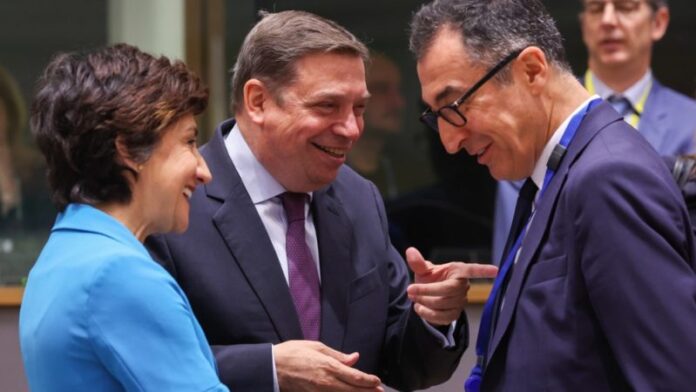The agriculture ministers of Spain and Germany have opposite views on what the European Food Safety Authority’s (EFSA) recent verdict on glyphosate should mean for the decision on re-approving the contentious herbicide.
In early July, EFSA presented the main conclusions to its long-awaited risk assessment of glyphosate, the contentious but most widely used herbicide in the EU. According to the agency, no “areas of critical concern” were found when it comes to potential harmful impacts of using the substance in plant protection.
While the agency’s assessment is a key step towards a decision on the EU-wide re-approval of glyphosate beyond December 2023, not all EU countries are on the same page about what to make of EFSA’s conclusions.
Speaking on the sidelines of an EU agriculture ministers’ meeting in Brussels on Tuesday (25 July), German Agriculture Minister Cem Özdemir said that, in his view, the verdict was not based on a comprehensive evaluation, hinting that it should not be taken at face value.
“For us, the EFSA study is a study that did not sufficiently take into account a key aspect, namely the impacts on nature,” the Green minister said.
“This is as if you are driving a vehicle, and you test out everything, but you do not test the brakes – I think that does not make a lot of sense.”
Conversely, Spanish minister Luis Planas, who chairs the EU Agriculture Council until the end of the year, said the verdict issued by EFSA is a scientific conclusion and should thus be followed, regardless of its content.
“The Spanish view on that is very simple: If the advice is negative, we have to follow [it]; if it is positive, we have to follow [it too]. Scientific advice is what counts for this file,” he said.
“We are waiting for the Commission to present its proposal following the EFSA report and we are open to that,” Planas concluded
While EFSA is yet to publish its full report, a draft Commission report leaked last week suggested the EU could decide to renew the glyphosate approval as soon as September.
In its long-awaited verdict on the risk posed by the divisive herbicide glyphosate, EU food safety authority EFSA has found ‘no critical areas of concern,’ although it said data gaps did not allow conclusions on certain aspects.
Özdemir, backed by the whole German government, has been a vocal opponent of re-approving glyphosate but hinted that Berlin could be outnumbered on the issue.
“Our position is clear. I am campaigning for a majority of member states to say ‘no,’ but at the end of the day, I am of course bound to the legal framework,” he said.
The Berlin government has committed to “taking glyphosate off the market” nationally from the end of 2023. However, as long as the substance is still approved in the EU, the legal scope for a national ban is very limited.
Meanwhile, German agrochemical giant Bayer has had to lower its full-year forecast – mainly due to a drop in glyphosate sales.
“Further price declines and lower volumes due to channel de-stocking, especially for glyphosate-based products, as well as adverse weather conditions, have increased pressure,” the company said in a statement issued on Monday evening.








